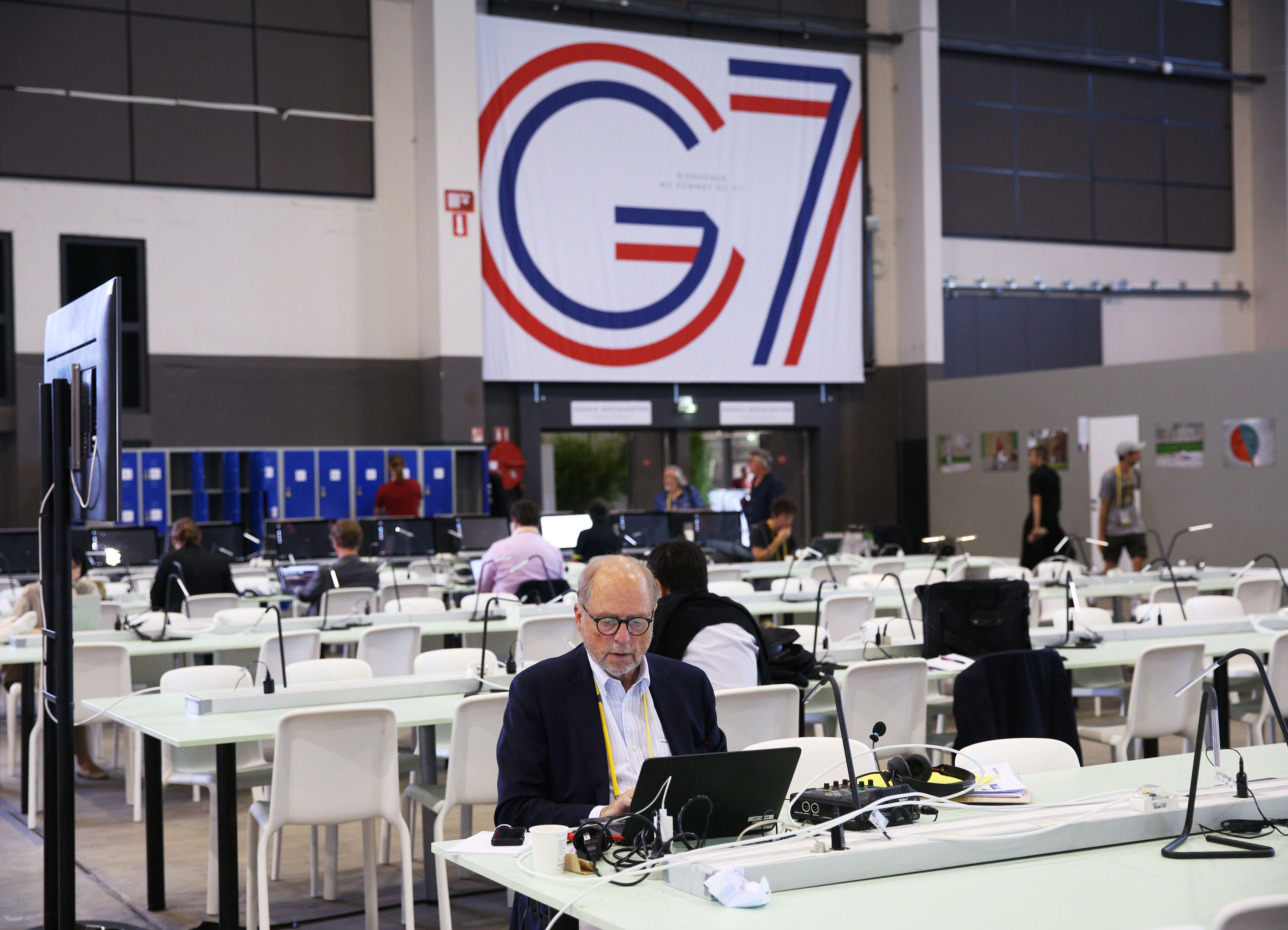Climate change, Iran nuclear issue, trade disputes, Brexit and the digital tax are all hard topics that the G7 plus the European Union (EU) have yet to reach any consensus on. It is predicted that this year's summit would witness further disunity of the group.
by Xinhua writers Ren Ke, Liu Fang
BIARRITZ, France, Aug. 24 (Xinhua) -- From Aug. 24 to Aug. 26, leaders from seven of the world's major developed countries get together on the seaside town of Biarritz in southern France for the G7 summit.
Climate change, Iran nuclear issue, trade disputes, Brexit and the digital tax are all hard topics that the G7 plus the European Union (EU) have yet to reach any consensus on. It is predicted that this year's summit would witness further disunity of the group.
Formed in the 1970s as a club for the richest countries, the influence of G7, which groups France, Germany, Italy, Japan, the United States, the United Kingdom, and Canada, on global issues is dimmed as divisions among the members lay bare as well as emerging economies are growing remarkably.

Security personnel check bags in Biarritz, southwestern France, on Aug. 23, 2019. (Xinhua/Gao Jing)
HARD TALKS
According to the official agenda, leaders from the G7 and the EU will focus on addressing inequality and climate change. They will also discuss other issues from the economy to foreign and security policies.
Experts believe that after last year's summit in Charlevoix, Canada, with an unhappy ending, leaders attending this year's summit might again not be so happy as what they could seem to be in the group photo.
G7 summit in 2018 ended with U.S. President Donald Trump leaving early and disavowing the final communique. German Chancellor Angela Merkel later shared a memorable photograph taken at the summit in which leaders stood around a sitting Trump, in postures that appeared quite tense.
This time the situation could be tougher -- not only on climate change, but also on Iran and trade disputes. Digital tax has become a hotspot too.
Britain, France and Germany are trying their best to de-escalate the tensions in the Gulf Region, save the Iran nuclear treaty and help European companies doing business in Iran avoid U.S. sanctions, while Washington's unilateral withdrawal of the deal is pushing the region to the brink of conflict.
Besides, the United States and France are at loggerheads over digital tax. French President Emmanuel Macron said U.S. tech giants are paying unfairly low taxes and urged Washington to help reform the global tax code, while Trump threatened to take tit-for-tat actions on the French wine for what he considered Macron's "foolishness."
The Brexit is another stumbling block within the G7. British Prime Minister Boris Johnson visited Berlin and Paris on Wednesday and Thursday, in a bid to seek support to change the "backstop" regulating the border between British Northern Ireland and Ireland, but both Merkel and Macron declined Johnson's proposals.
Amid a wide range of disputes, it is reported that the summit will perhaps not make a joint communique.

Journalists work at the G7 summit press center in Biarritz, southwestern France, Aug. 23, 2019. (Xinhua/Gao Jing)
U.S., EUROPE DRIFTING APART
Having survived the Cold War and many economic crises, the traditional G7 allies are now alienating each other, above all the United States and Europe.
Since Trump assumed office, the bloc once led by the United States has suffered continuous cracks. Washington did not see eye to eye with others on trade, military budget and even the North Atlantic Treaty Organization (NATO).
Adopting "America First" policy, Washington threatened to withdraw troops from Germany and to impose high tariffs on European products, and the U.S. president even called the names of several European leaders.
Such U.S. changes have disappointed Europeans. A survey conducted by German organization Atlantic Bridge found that 85 percent of Germans view U.S.-Germany relations as negative or very negative.
"German-U.S. ties are breaking down," German media Spiegel Online wrote Wednesday. It said the communication between Trump and Merkel, one of the most important European politicians, has been scaled back to a minimum.
What is more, when Merkel finished her speech at February's Munich Security Conference with an appeal to cooperation, state leaders and ministers broke into a prolonged and loud applause. However, when U.S. Vice President Mike Pence said he brought Trump's greetings and then paused for applause, there was only an embarrassing silence.
Facing U.S. unilateral moves, the EU said in a statement this week that the G7 summit will be an opportunity for it to defend the rules-based order and its organizations as the best approach for global governance.
"Europe must oppose Trump at the G7," Jeffrey Sachs, an economics professor at Columbia University, wrote Monday in a column, adding Europe must confront Trump on Iran, trade and a whole host of issues.
"By opposing Trump and defending the international rule of law, including rules-based international trade, Europeans and Americans together can strengthen the world peace and trans-Atlantic amity for generations to come," Sachs wrote.

Policemen stand guard in Biarritz, southwestern France, on Aug. 23, 2019. (Xinhua/Gao Jing)
DOWNGRADING "RICH CLUB"
Widely viewed as a group of rich nations, the G7 was created 44 years ago to address the economic crisis at that time. However, as disputes dividing the group last year are expected to be on show again, the bloc is no longer quite what it used to be.
"It does not have the same meaning as before," Remi Bourgeot, an economist and associate fellow at the French Institute for International and Strategic Affairs, told Xinhua.
Bourgeot added that now the final communique no longer really exists because the summit has become just a venue, a forum, and a place for tough negotiations. "There are not very high expectations" for a big final of the G7 summit, he said.
Besides, G7's influence on global issues is also on the wane with the rise of emerging economies, said Xin Hua, executive director of the Center for European Studies at Shanghai International Studies University.
As the group was proved incompetent to address the 2008 financial crisis, when the G20 summit was firstly held. Since then, the G20 has become a major framework for global governance.
Statistics showed that G7 countries' share of the gross domestic products (GDP) in the world has shrunk from over 70 percent in the 1980s to less than a half now, while G20 countries now account for over 80 percent of the global GDP.
"G7 cannot exercise key influence over global issues. Instead, it acts as only a forum for the United States, Europe, and Japan," said Xin.
Russia President Vladimir Putin also said during his visit in Paris on Monday that he valued G20 more than G7, adding that he believes other regional organizations, such as the Shanghai Cooperation Organization and the BRICS, have also become important. Enditem
(Xinhua reporters Ying Qiang, Xu Yongchun and Chen Chen in Paris, Tian Dongdong in Brussels also contributed to the story.)
(Video reporter: Han Qian; Video editor: Wang Han)



